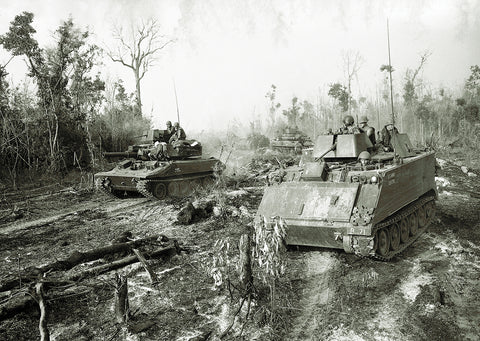
Vietnam War Armored Cavalry in Photos
The 11th Armored Cavalry
“Blackhorse” Regiment traces its origins to the 11th Cavalry Regiment, formed
in 1901. After a series of redesignatons, it became the 11th Armored Cavalry
Regiment in 1948. The unit served in Vietnam 1966-72. (Historynet Archives)
One of the U.S. Army’s specialized units in Vietnam was the 11th Armored Cavalry Regiment, nicknamed the “Blackhorse Regiment.” When deployed in 1966, the regiment was equipped primarily with M113 armored personnel carriers modified with additional guns and shields to become “armored cavalry assault vehicles” for a more offensive role. The ACAV’s basic armament consisted of two 7.62 mm M60 machines guns mounted on either side of the cargo top hatch and a .50-caliber M2 machine gun upfront, protected by a rounded armored collar with armor plates fore and aft to afford more protection for the gunner. Backed by flamethrower-equipped M113s called M132 “Zippos,” M551 Sheridan light tanks and M109 self-propelled howitzers, Blackhorse ACAV crews fought with distinctive aggressiveness in numerous operations in the Saigon area between 1966 and 1972. By mid-1967 mechanized infantry units, which also used M113s, were retrofitting their vehicles to make them similar to ACAVs, but their tactics still differed. Mechanized infantry fought both mounted and dismounted, while the armored cavalry primarily operated mounted and on the move. The Blackhorse Regiment, with three squadrons, was the only full armored cavalry regiment in Vietnam, but most infantry divisions had their own armored cavalry squadrons, adding five to the list: 1st Squadron, 4th Cavalry Regiment, 1st Infantry Division; 1st Squadron, 10th Cavalry, 4th Division; 3rd Squadron, 5th Cavalry, 9th Division; 1st Squadron, 1st Cavalry, 23rd Division (Americal); and 3rd Squadron, 4th Cavalry, 25th Division.
This article appeared in the Autumn 2022 issue of Vietnam magazine.
Sending a handwritten message to the enemy are troops
from the 11th Armored Cavalry clearing the Bo Ho Woods area northwest of
Saigon on May 27, 1971. (AP Photo/Rick Merron)
Soldiers in Troop E, 1st
Squadron, 1st Cavalry Regiment, 23rd Infantry Division (Americal), halt for
awhile. (Jerzy Krzeminski)
M113 crewmen of the 11th Armored Cav
in Cambodia on the night of July 6, 1970, are silhouetted in the glare of
tracer bullets during a “mad minute” exercise, in which they spray the area
around them to detect enemy infiltration before moving on. (AP Photo/Henri
Huet)
A member of Troop L, 3rd Squadron, 11th Armored Cav
guides an ACAV across a river ford during Operation Junction City Phase II
north of Saigon on April 7, 1967. (National archives)
An M132 “Zippo” armored flamethrower of 1st Squadron, 4th
Cavalry Regiment, 1st Infantry Division, incinerates an enemy position in the
Iron Triangle between Saigon and Cambodia during Operation Cedar Falls in
January 1967. (Photo by Dick Swanson/Getty Images)
An ACAV crewman
from the 11th Armored Cavalry works outside the vehicle. (Joseph Gibbs
Collection)
Soldiers of the 11th
Armored Cavalry’s 2nd Squadron slog through monsoon mud near Fire Support Base
Warrior 25 miles northwest of Saigon on Sept. 18, 1971. (AP Photo)
M113 ACAVs and M551 Sheridan tanks of 1st Squadron, 1st
Cavalry, attached to the 23rd Infantry Division (Americal), prepare for an
operation in August 1968. (Jerzy Krzeminski/John Krisman collection)
ACAVs move in file across a clearing in War Zone C, along
the Cambodian border, on Feb. 24, 1967. The tracks of other armored vehicles
are already imprinted into ground. (AP Photo/Kim Ki Sam)
M113 armored cavalry assault
vehicles, or ACAVs, and M551 Sheridan light tanks of the 11th Armored Cavalry
Regiment plow through rough terrain about a mile and a half from the Cambodian
border on March 18, 1970. (AP Photo/Charles Ryan)
this article first appeared in vietnam magazine
Facebook: @VietnamMag | Twitter: @VietnamMag
